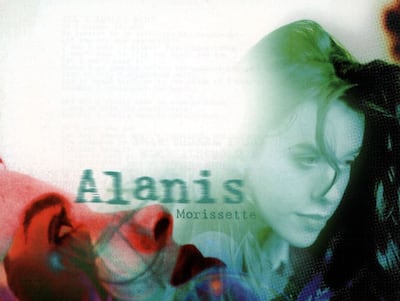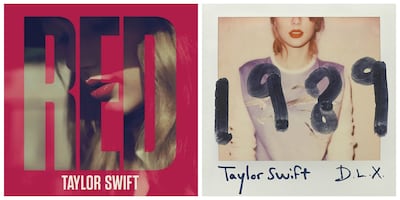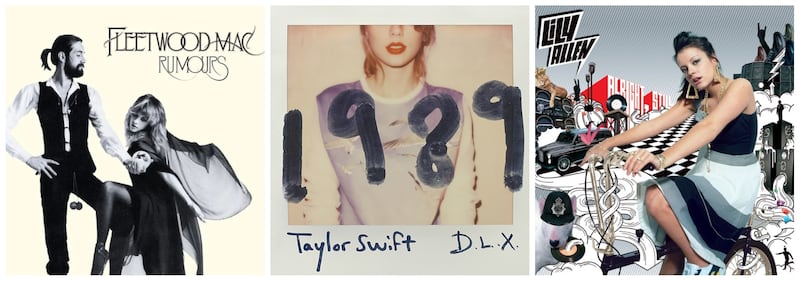Celebrating its 20th anniversary on Saturday, Alicia Keys’s triple-Grammy winning album The Diary of Alicia Keys remains proof that autobiographical albums that provide a distinctly personal snapshot rarely age.
“The songs were very much about her life and experiences and the album was called The Diary because it was personal,” said executive producer Peter Edge.
The hit album featured the tracks You Don’t Know My Name, If I Was Your Woman and If I Ain’t Got You. Keys herself also called the release “deeply personal and autobiographical.”
A subgenre of the concept album category in which musicians develop an album around a theme, the autobiographical or diary album is timeless thanks to the snapshot it provides of an age or experience.
From Marvin Gaye to Taylor Swift, here are some of the best autobiographical albums.
Rumours (1977), Fleetwood Mac
Few albums are as raw and personal as this 1977 offering from the British-American rock band.
During the recording sessions, keyboard player and vocalist Christine McVie and bass guitarist John McVie divorced after eight years of marriage and stopped talking to one another.
Guitarist and singer Lindsey Buckingham and lead singer Stevie Nicks were in a tumultuous on-off relationship and drummer Mick Fleetwood had recently discovered that his wife was having an affair with his best friend.
The album produced the classics Go Your Own Way and Second Hand News – both written by Buckingham about his split from Nicks – as well as Dreams, The Chain and Don’t Stop, which was written by Christine about John.
In 2017, the album was deemed “culturally, historically or aesthetically significant” by the Library of Congress and selected for preservation in the National Recording Registry.
“Every time those words would come onstage, I wanted to go over and kill him,” Nicks told Rolling Stone about Go Your Own Way. “[Buckingham] knew it, so he really pushed my buttons through that. It was like, ‘I'll make you suffer for leaving me.' And I did.”
Here, My Dear (1978), Marvin Gaye
Arguably, fewer albums in the history of music have ever provided such a snapshot of a moment in life than Gaye’s 1978 double album, Here, My Dear.
After Gaye’s estranged first wife Anna Gordy Gaye sued the singer for divorce in November 1975 claiming irreconcilable differences, Gaye was arrested for failing to pay alimony.
As the case dragged on, Gaye’s lawyer convinced him to give half the royalties from his next Motown album to Anna which resulted in Here, My Dear.
The track listing reads like a divorce court transcript, including Anger, Is That Enough, Anna’s Song, You Can Leave, But It's Going to Cost You and more poignantly, When Did You Stop Loving Me, When Did I Stop Loving You.
Although initially wanting to produce a “quickie record”, saying, “why should I break my neck when Anna was going to wind up with the money anyway?” In the album’s liner notes, Gaye revealed that he had “sang and sang until I drained myself of everything I'd lived through.”
Jagged Little Pill (1995), Alanis Morissette

For Morissette’s third album, the Canadian singer-songwriter, then 21, mined her personal life to devastating effect, producing an album that hit number one in 13 countries.
She also won five Grammys, including Album of the Year, making her the youngest artist at the time to win. It featured the tracks You Oughta Know, Ironic, Hand in Pocket and Head Over Feet.
Los Angeles Times writer Steve Hochman declared that rarely does an artist explore such “extreme emotional games” as Morissette does on Jagged Little Pill.
“This record represents me, and anything other than this is not a record I am interested in being a part of,” she wrote in an essay for Medium. “As a true Gemini, I was craving all of it. Wholeness was my obsession, and music allowed and continues to allow me to explore all of it.”
Alright Still (2006), Lily Allen

Allen parlayed her early MySpace fame into a record deal, releasing her debut album in 2006.
The Grammy-nominated album is a reflection of her life then on the fringes of adulthood and minor fame as the daughter of actor Keith Allen.
The hit single Smile documented her break-up with her ex, Lester Lloyd. In LDN, she tackles how it is to live in London and implores her brother, Game of Thrones actor Alfie Allen, to get his life together in Alfie.
“I always thought you should write about what you know, what’s going on in your life,” she told The Sun of the album’s inspiration.
21 (2011), Adele
Fittingly for a singer who has named all her studio albums for the age she was when she made them – 19, 21, 25 and 30 – 21 was released in 2011 and encapsulates for Adele's legion of fans what it feels like to be on the cusp of adulthood.
Beginning writing the album while in a relationship, the album was put on hold when Adele’s inspiration dried up, only to be reignited in the aftermath of her break-up.
Featuring the hits Rolling in the Deep and Set Fire to the Rain, the singer channelled her heartbreak most famously into the track Someone Like You, saying: “When I was writing it, I was feeling pretty miserable and pretty lonely … this is me on my knees really.”
Red (2012) and 1989 (2014), Taylor Swift

She’s made a fortune out of sharing her innermost thoughts and experiences and turning them into lyrics for her fans, so it can be argued that each of Swift’s albums is a diary of a period of her life.
Two confessional standouts in her discography are 2012’s Red and 2014's 1989.
The popular theory about Red is that most of the songs were inspired by Swift’s brief relationship with actor Jake Gyllenhaal.
Tracks included I Knew You Were Trouble, We Are Never Getting Back Together, 22 and All Too Well for which she would later write and direct the music video.
Similarly, 1989 finds the singer in a reflective mood, this time projecting outward. She shares her thoughts on her image in Blank Space, her celebrity feuds (Bad Blood), new directions (Shake It Off) and the end of her relationship with Harry Styles in Out of the Woods and Style.
Good Kid MAAD City (2012), Kendrick Lamar

Released in 2012, Good Kid MAAD City was Lamar’s first major label album, earning the rapper four Grammy nominations.
The album is undeniably autobiographical, charting Lamar’s experiences growing up in Compton, LA and the disenfranchisement, gang violence and economic hardships many who live in the city feel.
Standout tracks such as The Recipe (“I'm living but, really though, it's never enough”) and Backseat Freestyle (“Martin had a dream / Martin had a dream / Kendrick have a dream) follow Lamar’s evolution in a way that led the album to be named by Rolling Stone in 2022 as the greatest concept album of all time.
Blond (2016), Frank Ocean

“There's no fantasy on this record,” Ocean told MTV about his 2016 album. “It's all, for better or for worse, autobiographical, and just my experience. The foundation of what’s made me who I am today.”
Ocean’s second studio album explores emotional themes such as masculinity, loss and heartbreak, with searing introspection on tracks such as Nikes, Solo and Pink + White.
Certainly the singer's most backwards-looking album, he credits a desire to find out where he came from for the platinum-selling release’s success.
“We're not telling the stories to ourselves, we know the story,” he told the New York Times. “We're just seeing it in flashes overlaid.”






